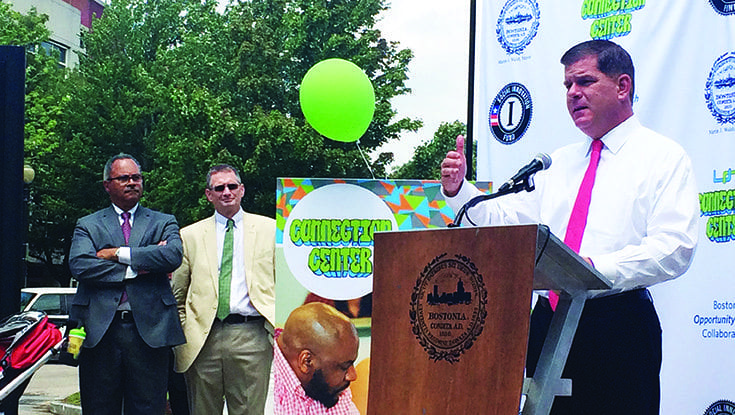Mayor cuts ribbon on Connection Center
Aims to connect disengaged young adults to training, jobs

Mayor Martin Walsh and the Boston Opportunity Youth Collaborative cut the ribbon this week on the Connection Center, a resource to assist Bostonians ages 20 to 24 who have a high school credential but are not engaged in employment, further education or job training.
At the new center, operated by Roxbury-based X-Cel Education, a staff of “success coaches” will assess the needs of disengaged young people and guide them to appropriate training, educational opportunities and work.
Though the official launch event was July 27, the organization has been operating quietly since February in its location within the Ruggles MBTA Station near the entrance to the Northeastern University campus.
With Connection Center assistance, Jandira Oliveira of Dorchester landed a spot in a 15-week Careers in Banking and Finance course at the Asian American Civic Association.

Author: Sandra LarsonWith the help of the Connection Center, Jandira Oliveira of Dorchester is pursuing a Careers in Banking and Finance training program.
Oliveira, 24, who came to the U.S. from Cape Verde at 18 and recently completed her GED, said Connection Center staff member Kelly Folsom accompanied her to AACA for the initial interview and English, math and writing tests. She was one of 10 applicants selected from a pool of about 100, she said, and started her training last week.
“So far, it’s really good,” she said. In addition to the all-day training, Oliveira is working part-time, caring for a baby daughter and aiding an ill grandmother. She is looking forward to working as a bank teller or personal banker after completing the AACA program.
Folsom said that when young people come to the Connection Center, staff members refer them to local organizations such as AACA, Year Up and College Bound Dorchester, and in the process become “stakeholders” for them.
“We are connecting them to other organizations, but we are there for them, and if it doesn’t work out, we want them to come back here,” he said. “We can evaluate what happened and locate another program.”
Such starts and stops are to be expected of a population of young people who for whatever reason have not found steady footing in traditional schooling or entry-level jobs.
Neil Sullivan, executive director of the Boston Private Industry Council, said his organization is working with the Walsh administration to take up the challenge of creating a high-school-to-early-career system that “circles back over and over” to reengage those who have fallen behind.
“We’re reaching out to a population that’s largely invisible to the public and to policymakers,” Sullivan told the Banner. He added that while Boston Public Schools does a good job of reengaging school dropouts, young adults reaching 21 no longer have the option to come back to high school, and thus need to be reached by other means.
Network approach
The Boston Opportunity Youth Collaborative was convened in 2013 by the Private Industry Council and the Boston Opportunity Agenda with funding support from the Aspen Institute Opportunity Youth Incentive Fund for Community Solutions. The BOYC’s more than 70 members include community-based organizations, city agencies and local colleges and universities.
The Connection Center concept grew out of a multi-agency brainstorming process that included six youth participants. One of those was Rommel Glover of Roxbury, who spoke briefly at Monday’s ribbon-cutting event.
“The way I grew up, my voice wasn’t heard at all,” said Glover, 25. “This has helped me with that a lot.”
Based on surveys and focus groups with 370 Boston young people, he said, the youth team recommended a center where youth would “feel safe, be able to be connected to what they wanted to do, and to get help from a life coach.”
Glover and the others were gratified —even “shocked” — to witness the creation of a center that encompasses so many of their recommendations.
Walsh touched on his own life story as someone who did not finish college on his first try. College wasn’t for him at that time, he said, but he had a connection to the building trades, where he was able to earn money and come to a later decision about his future career.
“But today it’s tougher for young people,” he said. “A high school diploma is not the same today on the job market, and college is more expensive.”
Boston was one of seven cities chosen to receive funding from the Aspen Institute and Jobs For the Future to create new access to career paths. Walsh said Boston is the first city to reach out to disconnected graduates, and other cities are now looking to Boston as a model.
About five thousand youth and young adults in Boston have high school credentials but are not working or pursuing higher education, Walsh said, and service to this population, now often referred to as “opportunity youth,” has been long-needed.
“We weren’t there for generations of young people that needed us,” he said. “We’re here today for future generations.”






